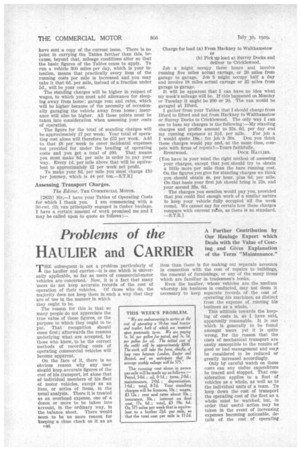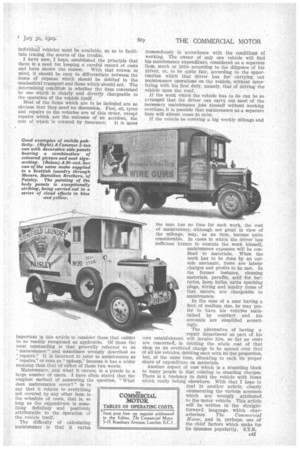Problems of the
Page 68

Page 69

If you've noticed an error in this article please click here to report it so we can fix it.
HAULIER and CARRIER A Further Contribution by Our Haulage Expert which Deals with the Value of Costing and Gives Explanation of the Term "Maintenance."
+THE subsequent is not a problem particularly of the haulier and carrier-it is one which is universally applicable, so far as users of commercial-motor vehicles are concerned. Now, it is a fact that many users do not keep accurate records of the cost of operation of their vehicles. Of those who do, the majority does not keep them in such a way that they are of use in the manner in which they ought to be.
The reason for this is that so ninny people do not appreciate the true value of these figures, or the purpose to which they ought to be put. That recognition should come first ; afterwards the reasons underlying what are accepted, by those who know, to be the correct methods of recording costs of operating commercial vehicles will become apparent.
On the face of it, there is no obvious reason why any user shopld keep accurate figures of the cost of his transport, let alone that of individual members of his fleet of motor vehicles, except as an Item, or series of items, in the usual analysis. There it is treated as an overhead expense, one of a dozen or more to be taken into account, in the ordinary way, in the balance sheet. There would seem to be no more reason for keeping a close check on it as an item than there is for making out separate accounts in connection with the cost of repairs to .buildings, the renewal of furnishings, or any of the many items which are familiar in tradesmen's books. . Even the haulier, • whose vehicles are the medium whereby his business is conducted, may not deem it necessary to keep separate records of the cost of operating his machines, as distinct from the expense of running his business as a whole.
This attitude towards the keeping of costs is, as I have said, apparently reasonable. It is one which is generally to be found amongst users yet it is quite wrong, for the reason that the costs of mechanical transport are easily susceptible to the results of good or bad management and may. be considered to be reduced or greatly increased accordingly.
Only by careful watch on those costs can any undue expenditure be traced and stopped. That consideration applies to a fleet of vehicles as a whole, as well as to the individual units of a team. To keep down the cost of transport the operating cost of the fleet as a whole must be watched, but, in order that useful action may be taken in the event of increasing expenses becoming noticeable, details of the cost of operating individual vehicles must be available, so as to facilitate tracing• the source of the trouble.
I have now, I hope, established the principle that there is a need for keeping a careful record of costs and have shown the reason. With that reason in mind, it should be easy to differentiate between the items of expense which should be debited to the mechanical transport and those which should not. The determining condition is whether the item concerned be one which is clearly and directly chargeable to tile operation of the vehicle itself.
Most of the items which are to be included are so obvious that they need no discussion. Fuel, oil, tyres and repairs to the vehicles are of this order, except repairs which are the outcome of an accident, the cost of which is covered by insurance. It is more important in this article to consider those that caithet be so readily recognized as applicable. Of these the most outstanding is that generally referred to as maintenance " and sometimes wrongly described as "repairs." It is incorrect to refer to maintenance as "repairs," or even as "upkeep," because it has a wider meaning than that of either of those two words, ' . The difficulty of calculating maintenance is that it varies tremendously in accordance with the conditions Of working. The owner of only one 'vehicle will find his maintenance expenditure, considered as a separate 'item, much or little according to the diligence of his driver, or, to be quite fair, according to the opportunities which that driver has for carrying out maintenance operations on the vehicle, without interfering with his first duty, namely, that of driving the vehicle upon the road.
• If the work which the vehicle has to do can be so arranged that the driver can carry out most of the necessary maintenance jobs himself without working overtime, it is possible that maintenance as a separate item will almost cease to exist.
If the vehicle be covering a big weekly mileage and the man has no time for such work, the cost of maintenance, although not great in view of the mileage, may, as an •item, become quite considerable. In cases in which the driver has Sufficient leisure to execute the work himself, maintenance expenses will be confined to materials. When the work has to be done by an outside mechanic, there are labour charges and profits to be met. In the former instance, cleaning materials, paraffin, acid for batteries, lamp bulbs, extra sparking plugs, wiring and sundry items of that nature, are chargeable to maintenance.
In the case of a user having a fleet of medium size, he may prefer to have his vehicles maintained by contract and his accounts are simplified accordingly.
The alternative of having a repair department as part of his own establishment will involve him, so far as costs are concerned, in debiting the whole cost of that shop as an overhead charge to be spread over that of all his vehicles, debiting each with its due proportion, but, at the same time, allocating to each its proper share of expenditure on materials.
Another aspect of cost which is a stumbling block to many people is that relating to standing charges. There is a tendency to debit the vehicle with items which really be ong elsewhere. With that I hope to deal in another article, clearly enumerating the various accounts which are wrongly attributed to the motor vehicle. This article will be written in the straightforward language which char acterizes The Commercial Motor, and is, perhaps, one of the chief factors which make for its immense popularity. S.T.R.












































































































